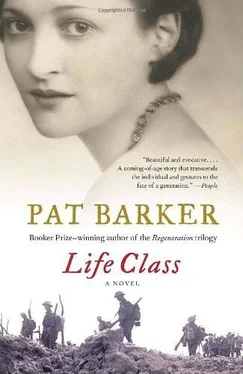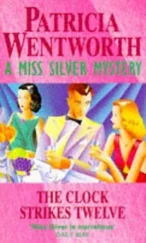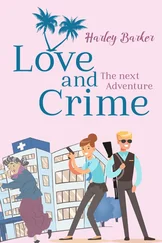As soon as they were alone, they kissed again, trembling and laughing, trying to recapture the impersonal passion that had gripped them in the cab, but not quite managing it.
‘I have to go, I’m afraid,’ Paul said, taking out his watch as he spoke. ‘I’m late.’
First the Cheshire Cat, now the White Rabbit, Elinor thought. She pinched the skin on her left wrist hoping the pain would restore the material world, but she continued to feel that the afternoon had become unexpectedly bizarre, and that she hardly recognized the self who was standing there.
They kissed. He went. She followed him to the end of the corridor and watched his head and shoulders descending the stairs, leaving her behind, going off about his business of which she knew nothing.
Back in the room she sat on the bed and tested it. The clanging of springs was so noisy she felt everybody in the house must hear, but that was nonsense of course. The room next door was used only for storage. She heaved her bag on to the bed and began unpacking. The wardrobe was so shallow she had to push the hangers sideways to get the door to close, but the wood smelled of something dry and sweet. Then she was at a loss. She stood at the window looking out over the roofs, as the sinking sun cast angular shadows that had not been there when she first looked out only half an hour ago. At one point she got up and fetched her sketchbook, but she couldn’t settle, couldn’t see anything. Her eye glided over surfaces, taking nothing in. Perhaps she should try to get some sleep, but then, looking down into the garden, she felt a blaze of energy. There’d be time enough to sleep when she was dead.
Quickly she poured water into the bowl, washed, ran a comb through her hair, grabbed a sketchbook and went out into the street.
Elinor found a café in the main square, where she sat for an hour, lingering over her coffee and watching passers-by in the market. Three men at the next table were waiting impatiently to be served. At last Madame appeared, a tall, heavy, dark-haired woman with premature creases in her upper lip, perhaps from the cigarettes she constantly and surreptitiously smoked or perhaps from her habit of clamping notes and even coins between her teeth while she negotiated the till, a shark of a machine that seemed determined to have her fingers off.
This was a small town. In her imagination it had swollen to the size of London or Paris, a vast anonymous city where you could move from place to palce and never bump into anybody you knew. Now the town had shrunk to its real dimensions she expected to see Kit at any moment, and what would she find to say to him? How could she explain her presence here when her last letter had been full of what was happening at the Slade with not a whisper of any projected trip to Belgium? He would be hurt, and rightly so. She waited until the shadows started to lengthen. Then she walked rapidly back along the little side street she’d discovered, reaching the house just as the white bowl of the street began to fill with darkness, from the pavement upwards, like somebody pouring tea into a cup.
She lay down on the bed and, although she felt she wouldn’t be able to sleep — too much whirring round inside her head — in fact she dropped off almost at once and when she woke again it was dark. She changed into the only dress she’d brought with her and had just finished brushing her hair when somebody tapped on the door. ‘Come in,’ she called, thinking it would be Madame Drouet, but no, it was Paul, still in uniform, looking tired and excited and unsure of himself in a way that made her stomach melt.
They looked at each other, aware of the angled roofs framed by the window and the moon staring in at them. The rumpled bed looked huge and white.
Paul laughed. ‘Come on, let’s go and eat. You must be famished.’
They went into town a different way, walking side by side, not touching, though she would have liked to take his arm. Just as they entered the square, they had to pause to let a crowd of nurses and men in wheelchairs cross the road. Drained, Elinor thought, as if somebody had pulled the plug and let their lifeblood run away. One man had bandages round his ears, with two red stains on the white gauze. She’d been telling Paul about her little trip to the café in the square. He’d said, ‘That’s where I go to write letters. You were probably sitting at the same table,’ but after the wounded were wheeled past they walked on in silence till they reached the restaurant.
They ordered beef in red wine with potatoes and beans and a carafe of red wine. Paul could hardly wait to pour it out. He drank two glasses quickly, like lemonade on a hot day, caught her watching him, and said, ‘Sorry! I’m not human till I’ve had a couple of drinks.’ But then, immediately, he poured himself another. The sight of his Adam’s apple jerking as he gulped the wine down was shocking, not like the Paul she knew at all. She was afraid he was going to sit there and get drunk, but no, with the third glass the rate of drinking slowed. After the food arrived, he drank very little. He looked better too, not so white.
‘You haven’t changed at all,’ he said.
You have, she thought. There were lines around his mouth and eyes that hadn’t been there the last time she saw him, but he’d gained weight.
‘You look a lot better.’
‘I feel better.’
‘No cough?’
‘No-o.’
She shrugged. ‘I was worried, that’s all. When they said about your mother and TB.’
‘My mother?’ For a second he looked blank. ‘No, she didn’t have TB. That’s on my father’s side.’
She tried asking him questions about his work at the hospital, but he obviously didn’t want to talk about that. Soon she was chattering on about her life in London, presenting it to him as more light-hearted, more like the life they used to share, than it really was. Trying to be honest, she mentioned Toby’s rows with her father about enlisting, which for a time had made every weekend painful, and about Catherine’s problems. There’d been riots, would you believe, in Deptford. Bricks through windows, houses set on fire, women and children joining in, not just the men, and the police watching.
‘What about your work?’ he asked.
‘Oh, I keep going. I had three paintings accepted for the New English Gallery.’
‘Three?’
‘Yes, I was surprised.’ She held up a hand to stop him refilling her glass. ‘What about you?’
‘What about me?’
‘Are you finding time to do any work?’
A brief smile, noting that what he did at the hospital apparently didn’t count as work. ‘A bit.’
She waited for him to go on, sensing that he both did and didn’t want to talk about this. ‘Sketches mainly. It hasn’t really been possible to paint, though of course now I’ve got the room it might be different.’
‘It’s a lovely room.’
‘Yes, I’ve been going there on my days off.’
She finished eating and pushed her plate away. ‘What do you draw?’
‘Oh, people at the hospital. Patients.’ His tone hardened. ‘That’s what I see. Though I don’t know what the point of it is. Nobody’s going to hang that sort of thing in a gallery.’
‘Why would you want them to?’
‘Because it’s there. They’re there, the people, the men. And it’s not right their suffering should just be swept out of sight.’
‘I’d have thought it was even less right to put it on the wall of a public gallery. Can’t you imagine it? People peering at other people’s suffering and saying, “Oh my dear, how perfectly dreadful” — and then moving on to the next picture. It would just be a freak show. An arty freak show.’
Читать дальше












